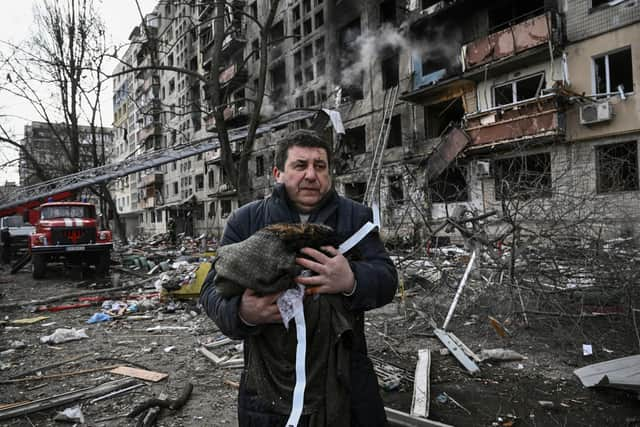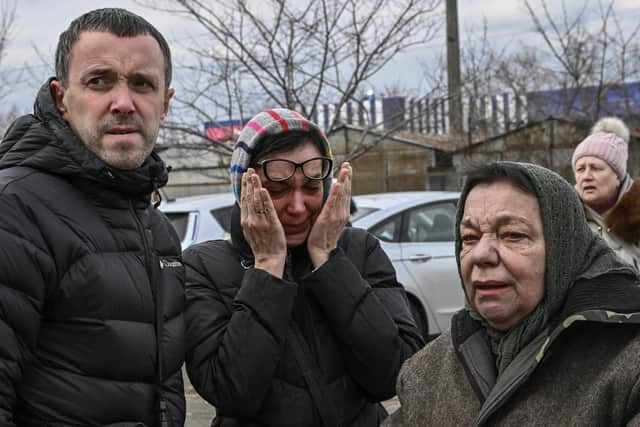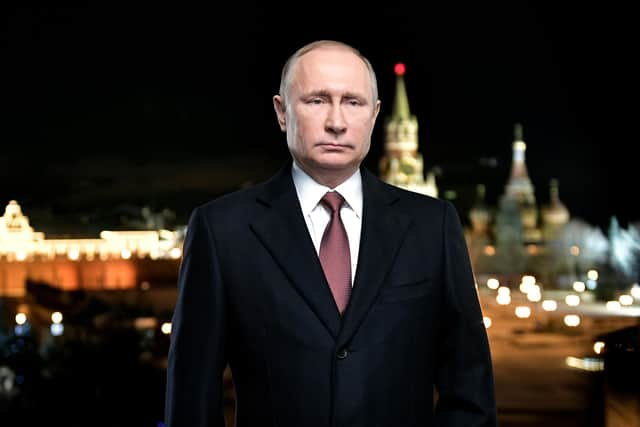Ukraine-Russia war: Here's how a peace deal could be agreed. And why it might not happen soon – Professor Marc Weller
Hence, unless Moscow subdues Ukraine entirely, some sort of diplomatic solution must be sought in the end. However distasteful a deal with President Putin may seem, if it has to happen, it should happen before even more massive destruction and death is brought upon Ukraine by the Russian invaders.
The Kremlin has outlined the conditions for ending the war in Ukraine “in a moment”. Russia added that the war aim is no longer the removal of the government in Kyiv, presumably a necessary step if the Ukrainian leadership is to be tempted into a peace deal.
Advertisement
Hide AdAdvertisement
Hide AdOf course, Ukraine’s President Zelensky will not jump at a settlement while the war is going better than expected. The present onslaught, with all the misery, suffering and destruction it has brought, will make it difficult if not politically impossible to make any concessions.
Instead, the Ukrainian government demands accountability of the Moscow leadership for launching an aggressive war and war crimes. There will also be a trillion-dollar bill for reparations.
At the first high-level talks between the foreign ministers of Russia and Ukraine, Sergey Lavrov and Dmytro Kuleba, held in Antalya, Turkey, last Wednesday, there were no signs of movement. Russia stuck to its unacceptable demands concerning the status of Donbas and Crimea and neutrality for Ukraine, although there have been signs of possible movement since.
From a western perspective, there are red lines any settlement cannot cross. There must be no formal recognition of territorial change brought about by force. Russia must not be left in control of Ukrainian territory it has occupied, creating a further ‘frozen conflict’ at the expense of Ukrainian sovereignty. And Nato’s position and coherence must not be undermined. Finally, the Ukrainian government must not be railroaded into a settlement it cannot accept.


Short of the wholesale occupation of the country and the imposition of a Russia-friendly parliament, one cannot readily imagine Ukrainian law-makers mustering the two-thirds majority necessary for a constitutional change rendering Ukraine a permanently neutral state. Nato will also not end its ‘open-door’ policy. International law prohibits threats against states in order to determine their foreign policy or alliances.
Still, and perhaps surprisingly, in January Washington appears to have made statements suggesting to Moscow that a moratorium on Nato admission for Ukraine for several years might be on offer. A settlement could involve a commitment of this kind, given formally or behind closed doors, for a more extensive period.
Immediate EU membership for Ukraine is also not realistic, given the accession criteria. This, too, might be noted formally or informally.
Next, Moscow is demanding that Kyiv must recognize the independence of Luhansk and Donetsk. The supposed statehood of both entities is, of course, the result of Russia’s use of force in 2014.


Advertisement
Hide AdAdvertisement
Hide AdIn law, the two are ‘non-states’; they cannot ever be legally recognised by other states. Instead, there could be far-reaching autonomy within Ukraine, going beyond the decentralisation provisions foreseen in the unimplemented 2015 Minsk II agreement. This could mean virtual independence and limited ties with Russia, subject to Ukraine’s sovereign jurisdiction.
While they will be reluctant to give up their claim to statehood, the settlement might restore governance over the full territories of both oblasts. Before the invasion, the secessionists only controlled a third of the provinces. Moreover, they would escape the fate of having to exist as non-states in total international isolation.
The Kremlin is also demanding acceptance of its forcible absorption of Crimea in 2014. Moscow argues it was illegitimately removed from Russia by Stalin in 1954 and has now been returned in line with the expressed will of its mainly Russian-speaking population. However, the UN General Assembly denied the legitimacy of the referendum in the territory and demanded its return to Ukraine.
In truth, even before the war there would have been no prospect for such a return. But that is quite different to a formal recognition of the forcible annexation. A realistic negotiating outcome would offer a finely balanced formula, excluding a future challenge to the present status quo without formally recognising it. This could be reinforced by a similarly nuanced declaration by other states, for instance in the format of the Organization for Security and Cooperation in Europe.


The Kremlin has referred to Ukraine’s demilitarisation. Rather than its total disarmament, Ukraine might agree not to obtain longer range missiles that could reach deeper into Russia. Ukrainian troop deployments around Donbas could be limited. This would be balanced by limits on Russian heavy weapons on Ukraine’s border.
Finally, Moscow wants a ceasefire. This could leave its armed forces in control of large swathes of Ukrainian territory beyond the Donbas, perhaps dividing the country permanently and cutting it off from the sea. Russian forces might regroup, be reinforced and re-supplied, and re-ignite the conflict. Hence, the various elements of a settlement would need to be dependent on a front-loaded withdrawal of Russian forces.
When considering Russia’s larger interests in this episode, one additional fact is noteworthy. Mr Putin’s threat of the use of force earlier this year was aimed at Ukraine, but the demands supported by that threat were not really in the main directed at Kyiv, but instead at the US and Nato.
In December, Russia demanded that Nato forces and weaponry must be withdrawn from allies that joined after 1997, essentially all Eastern European members. Obviously, Nato could not leave them out in the cold. Instead, mutual balanced-force reductions across Europe might be discussed in connection with the Ukrainian settlement.
Advertisement
Hide AdAdvertisement
Hide AdMoscow also demanded a US and Russian withdrawal of nuclear weapons to their respective home soil. Of course, Russia is part of Europe. Withdrawing its nuclear weapons to its home soil makes no difference. Intermediate range missiles could still reach the capitals of Western Europe and tactical nuclear weapons would be close by.
The same would not be true for the US, an ocean away. The decoupling of Europe from the US strategic nuclear umbrella would have been achieved. Still, the US has already offered talks on limitations of intermediate-range nuclear weapons, as existed until recently in the shape of the Intermediate-Range Nuclear Forces Treaty.
A settlement along these lines would impose only limited sacrifices on Ukraine and the West, beyond the horrors already experienced by Ukraine. But a settlement will only come about if both sides find themselves in a situation where they have no other, or better, choice.
Marc Weller is professor of international law at the University of Cambridge and a barrister at Doughty Street Chambers. He served as United Nations senior mediation expert and an advisor in many peace negotiations. He is the co-editor of International Law and Peace Settlements. The views expressed are his alone.
A message from the Editor:
Thank you for reading this article. We're more reliant on your support than ever as the shift in consumer habits brought about by coronavirus impacts our advertisers.
If you haven't already, please consider supporting our trusted, fact-checked journalism by taking out a digital subscription.
Comments
Want to join the conversation? Please or to comment on this article.
